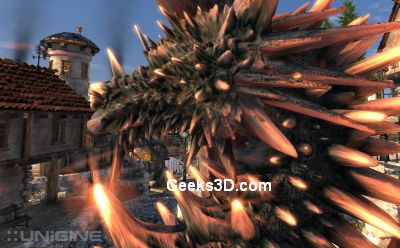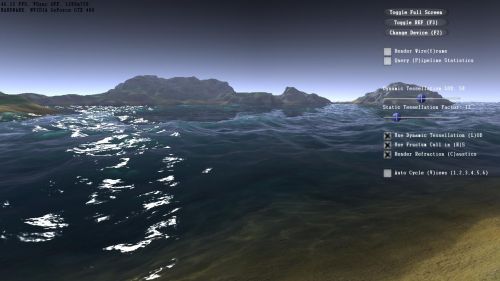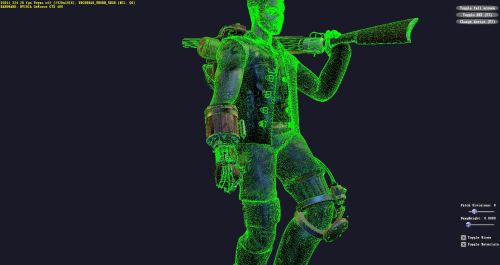ASUS ENGTX 560 Ti DirectCU II TOP Review Index
- 1 – ASUS GTX 560 Ti DirectCU II TOP: Presentation
- 2 – ASUS GTX 560 Ti DirectCU II TOP Features
- 3 – ASUS GTX 560 Ti DirectCU II TOP OpenGL performances
- 4 – ASUS GTX 560 Ti DirectCU II TOP Direct3D performances
- 5 – ASUS GTX 560 Ti DirectCU II TOP Gaming performances
- 6 – ASUS GTX 560 Ti DirectCU II TOP DirectCompute performances
- 7 – ASUS GTX 560 Ti DirectCU II TOP Power consumption and overclocking
- 8 – ASUS GTX 560 Ti DirectCU II TOP Conclusion
4 – ASUS GeForce GTX 560 Ti DirectCU II TOP Direct3D performances
4.1 Unigine Heaven (DirectX 11)
OpenGL tests have been finished on Unigine Heaven, what a better transition than starting Direct3D tests with Unigine Heaven 2.1, this time using the Direct3D 11 render path.

Settings: 1920×1080 fullscreen, tessellation: normal, shaders: high, 4X MSAA, 16X anisotropic filtering.
| 47.9 FPS, Scores: 1208 – EVGA GTX 580 SC |
| 47.6 FPS, Scores: 1200 – ASUS ENGTX580 |
| 42.9 FPS, Scores: 1081 – SAPPHIRE Radeon HD 6970 |
| 39.4 FPS, Scores: 991 – EVGA GeForce GTX 480 |
| 38.3 FPS, Scores: 966 – ASUS Radeon HD 6950 |
| 36.6 FPS, Scores: 9211 – ASUS GeForce GTX 560 Ti DirectCU II TOP |
| 26.8 FPS, Scores: 674 – ATI Radeon HD 5870 |
| 25.9 FPS, Scores: 653 – ASUS EAH6870 |
| 25.3 FPS, Scores: 637 – SAPPHIRE Radeon HD 6870 |
| 25.6 FPS, Scores: 646 – MSI N460GTX Cyclone 768D5 |
| 16.6 FPS, Scores: 419 – MSI R5770 Hawk |
4.2 3DMark11 (Direct3D 11)
3DMark11, Furturemark’s new Direct3D benchmark (see here for more details: 3DMARK11: New Gamer’s Benchmark for DirectX 11 is There (+ Big Pictures)),
has been added in Geeks3D’s benchmarks suite for graphics cards reviews.

3DMARK11 Entry mode (1024×600)
| E8463 – EVGA GeForce GTX 580 SC |
| E7598 – EVGA GeForce GTX 480 |
| E7481 – SAPPHIRE Radeon HD 6970 |
| E7137 – MSI R5770 Hawk 2-way CrossFire |
| E6957 – ASUS GeForce GTX 560 Ti DirectCU II TOP |
| E6837 – ASUS Radeon HD 6950 |
| E6285 – ATI Radeon HD 5870 |
| E6206 – SAPPHIRE Radeon HD 6870 |
| E5270 – MSI N460GTX Cyclone 768D5 OC |
| E4166 – ATI Radeon HD 5770 |
3DMARK11 Performance mode (1280×720)
| P5947 – EVGA GeForce GTX 580 SC |
| P5174 – EVGA GeForce GTX 480 |
| P5119 – SAPPHIRE Radeon HD 6970 |
| P4887 – MSI R5770 Hawk 2-way CrossFire |
| E4627 – ASUS Radeon HD 6950 |
| E4521 – ASUS GeForce GTX 560 Ti DirectCU II TOP |
| P4284 – ATI Radeon HD 5870 |
| P4188 – SAPPHIRE Radeon HD 6870 |
| P3251 – MSI N460GTX Cyclone 768D5 OC |
| P2648 – ATI Radeon HD 5770 |
3DMARK11 Extreme mode (1920×1080)
| X2020 – EVGA GeForce GTX 580 SC |
| X1812 – SAPPHIRE Radeon HD 6970 |
| X1672 – EVGA GeForce GTX 480 |
| X1594 – ASUS Radeon HD 6950 |
| X1565 – MSI R5770 Hawk 2-way CrossFire |
| X1565 – ATI Radeon HD 5870 |
| X1518 – ASUS GeForce GTX 560 Ti DirectCU II TOP |
| X1399 – SAPPHIRE Radeon HD 6870 |
| X947 – MSI N460GTX Cyclone 768D5 OC |
| X875 – ATI Radeon HD 5770 |
4.3 NVIDIA Island Demo: Tessellation (Direct3D 11)
NVIDIA Island demo is a D3D11 demo focused on, what a surprise, tessellation!

Settings: windowed (default size) and default params (tess factor: 12).
| FPS: 58 – EVGA GTX 580 SC |
| FPS: 57 – ASUS ENGTX580 |
| FPS: 46 – EVGA GTX 480 |
| FPS: 41 – ASUS GeForce GTX 560 Ti DirectCU II TOP |
| FPS: 25 – MSI N460GTX Cyclone 768D5 OC |
| FPS: 15 – Sapphire Radeon HD 6970 |
| FPS: 13 – ASUS EAH6870 |
| FPS: 13 – Sapphire Radeon HD 6870 |
| FPS: 13 – ASUS Radeon HD 6950 |
| FPS: 11 – ATI Radeon HD 5870 |
| FPS: 10 – MSI R5770 Hawk |
4.4 DirectX SDK SubD11: Tessellation (Direct3D 11)
SubD11 is a Direct3D tessellation demo from the DirectX 11 SDK June 2010.

Settings: 1920×1080 windowed, tessellation: 8X
| FPS: 256 – EVGA GTX 580 SC |
| FPS: 250 – ASUS ENGTX580 |
| FPS: 220 – EVGA GTX 480 |
| FPS: 172 – ASUS GeForce GTX 560 Ti DirectCU II TOP |
| FPS: 135 – MSI N460GTX Cyclone 768D5 OC |
| FPS: 106 – Sapphire Radeon HD 6970 |
| FPS: 100 – ASUS Radeon HD 6950 |
| FPS: 74 – ASUS EAH6870 |
| FPS: 73 – Sapphire Radeon HD 6870 |
| FPS: 60 – ATI Radeon HD 5870 |
| FPS: 53 – MSI R5770 Hawk |
Settings: 1920×1080 windowed, tessellation: 16X
| FPS: 120 – EVGA GTX 580 SC |
| FPS: 118 – ASUS ENGTX580 |
| FPS: 102 – EVGA GTX 480 |
| FPS: 82 – ASUS GeForce GTX 560 Ti DirectCU II TOP |
| FPS: 59 – MSI N460GTX Cyclone 768D5 OC |
| FPS: 29 – Sapphire Radeon HD 6970 |
| FPS: 27 – ASUS Radeon HD 6950 |
| FPS: 19 – ASUS EAH6870 |
| FPS: 18 – Sapphire Radeon HD 6870 |
| FPS: 16 – ATI Radeon HD 5870 |
| FPS: 15 – MSI R5770 Hawk |
Settings: 1920×1080 windowed, tessellation: 24X
| FPS: 52 – EVGA GTX 580 SC |
| FPS: 51 – ASUS ENGTX580 |
| FPS: 44 – EVGA GTX 480 |
| FPS: 37 – ASUS GeForce GTX 560 Ti DirectCU II TOP |
| FPS: 27 – MSI N460GTX Cyclone 768D5 OC |
| FPS: 11 – Sapphire Radeon HD 6970 |
| FPS: 10 – ASUS Radeon HD 6950 |
| FPS: 8 – ASUS EAH6870 |
| FPS: 8 – Sapphire Radeon HD 6870 |
| FPS: 8 – ATI Radeon HD 5870 |
| FPS: 7 – MSI R5770 Hawk |
Settings: 1920×1080 windowed, tessellation: 31X
| FPS: 30 – EVGA GTX 580 SC |
| FPS: 30 – ASUS ENGTX580 |
| FPS: 26 – EVGA GTX 480 |
| FPS: 23 – ASUS GeForce GTX 560 Ti DirectCU II TOP |
| FPS: 16 – MSI N460GTX Cyclone 768D5 OC |
| FPS: 7 – Sapphire Radeon HD 6970 |
| FPS: 6 – ASUS Radeon HD 6950 |
| FPS: 5 – ASUS EAH6870 |
| FPS: 5 – Sapphire Radeon HD 6870 |
| FPS: 4 – ATI Radeon HD 5870 |
| FPS: 4 – MSI R5770 Hawk |
ASUS ENGTX 560 Ti DirectCU II TOP Review Index
- 1 – ASUS GTX 560 Ti DirectCU II TOP: Presentation
- 2 – ASUS GTX 560 Ti DirectCU II TOP Features
- 3 – ASUS GTX 560 Ti DirectCU II TOP OpenGL performances
- 4 – ASUS GTX 560 Ti DirectCU II TOP Direct3D performances
- 5 – ASUS GTX 560 Ti DirectCU II TOP Gaming performances
- 6 – ASUS GTX 560 Ti DirectCU II TOP DirectCompute performances
- 7 – ASUS GTX 560 Ti DirectCU II TOP Power consumption and overclocking
- 8 – ASUS GTX 560 Ti DirectCU II TOP Conclusion
this thing is some beast..beating a GTX470 with only 8SM..they musta done some hella performance tweaks with the GF114
I think i’ll wait for a 660 then 😀
I wonder if my PSU could handle 2 of these…
At the moment it’s handling pretty well my 2 palit gtx 460 1gb which have a very similar tdp.
My PSU is a CORSAIR AX750 Gold 12cm PLUG (87+)
@Zibri: I’m sure that the AX750 can handle (without problem) two GTX 560 Ti highly stressed…
For comparison… with same settings my 2 GTX 460 score 1511 points and 60 FPS in unigine heaven.
Settings: 1920×1080 fullscreen, tessellation: normal, shaders: high, 4X MSAA, 16X anisotropic filtering.
TAKE OF THE COVER, FANS AND COOLER AND PICTURE IT PLEASE.
WANT TO SEE ITS DIFFERENCES TO REFERENCE LAYOUT.
JeGX pourquoi ne pas avoir monter les voltages ?
interdiction du fabricant , pas le temps pour peaufinner l’oc de la bête ?
dommage car la 560 ti à l’air d’etre la reine en overcloking … ou pas ?
I don’t think NVIDIA have used ‘Titatnium’ since GeForce 4?
@komar: juste pour une question de temps. Effectivement en augmentant la tension d’alim du GPU on devrait gagner quelques Hz de plus. J’essaierai de faire un test plus tard.
J’ai vu la review techpowerup de la bête ne te dérange pas .
Jetais juste curieux de savoir cb elle prenait en aircooling
Merci quand même JEGx
Greetings .
Pingback: NVIDIA R266.66 WHQL All Titanium Graphics Cards - 3D Tech News, Pixel Hacking, Data Visualization and 3D Programming - Geeks3D.com
I have to say I am quite impressed by the 560. The performance was expected, but still it’s nice to see it’s there.
noise?
@Michael: at idle, the card is extremely quiet. Under FurMark the cooler is noisy but is supportable (nothing to see with GTX 480 stock VGA cooler!). And I talk for an open case testbed…
Underwhelmed. You’ll get a 6950 for the same price using 20-30W less and has more performance. FAIL!
@DrBalthar: don’t forget the secret weapon of the GTX 560 Ti: overclocking. I will publish an article shortly 😉
Overclocking will just make it hotter and eat more power with marginal gain doubt it can cover the performance gap. Nvidia has piss poor Flop/Watt with the whole Fermi line.
Pingback: [GPU Tool] EVGA OC Scanner 1.6.0 Released - 3D Tech News, Pixel Hacking, Data Visualization and 3D Programming - Geeks3D.com
Very nice review, I was focussing my search on this reviewed card and the 6950 variant.
There are a lot of reviews of normal 560ti and 6950 based cards, but not so much of the asus direct CU versions.
I like the way you discuss things, they are righ spot on as what i was looking for.
Still not sure which card to pick, the 560Ti or the 6950 based on ASUS Direct CU II design, they are allmost the same price, but have both pros and cons.
I like playing BC2 for instance, the nvidia cards are better in this game, but what about future releases…those choices…:)
I got a 6950 hell of problems and the card was having problems with fable 3, i returned the card next day got a EVGA 560 ti next day and now is running any game over 50 fps. i will say this second ATI i buy and they all failed me.
A 6950 for the same price as a ENGTX 560 ti top CII?????? No way!!! At lease 700 bucks differance! I don’t know who ur supplier is, but no way. And I must agree with “6950 falls” ATI cards in general are very buggy and unstable, my last 3 ATI’s had constant issues, ranging from overclocking probs, to HDMI problems to even crossfire problems, ATI is just too much hassel in general. Although they are good value for money, and good performers, stick to the tried and tested man!! NVIDIA.
I just put together a nice system got it all running but the vidoe card wont display on the moniter and my motherboard has no on board video..I don’t know what I’m doing wrong.What I built was MB Asus Sabertooth X58 LGA 1366 R, PSU Antec TPQ-1200 1200W RT, CPU Intel Core 17 950 3.06G 45N R, MEM 4Gx3 KHX 1866C9D3K3 12GX R, HDD 1.5 WD WD15EARX 64M%… Any Info anyone can give would be great.